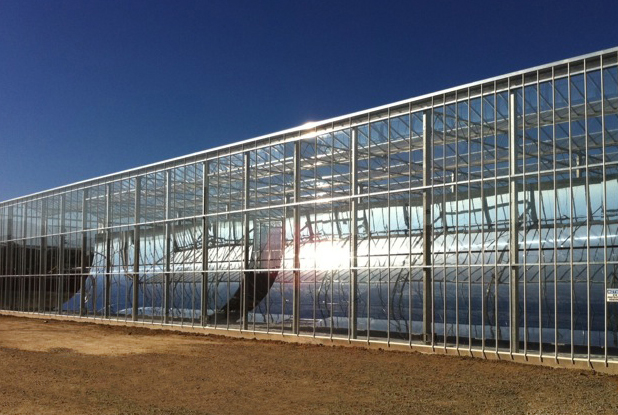Earlier this year I wrote about Glasspoint Energy and its innovative method of using solar power to heat water to make steam, which gets injected into old oil fields to coax out stubborn heavy oil. Glasspoint installs its cheap, flimsy aluminum foil-like solar collectors inside simple glass houses (think agricultural greenhouses), which shelter the gear from the elements. Materials costs are a fraction of those for more traditional solar collectors. Glasspoint’s first commercial project was for Berry Petroleum in the century-old oil fields near Bakersfield, Calif.

This week, Glasspoint announced a new deal, one that could blossom into something really big. The customer is Petroleum Development of Oman, the state-owned company that manages oil for the tiny Persian Gulf sultanate. Glasspoint will build four acres of glasshouses on a heavy oil field near the border with Yemen. Oman is the ideal customer for Glasspoint because the country’s oil is almost all heavy, thus requiring steam injection to get out; plus, Oman is short of the natural gas usually used to create that steam, and desperately wants to free up any gas it can for domestic consumption and export. Its sunshine, however, is among the fiercest in the world.
The Glasspoint project will displace roughly 57,000 mmbtu of natural gas a year — enough to produce 33,000 barrels of oil. That’s tiny, considering that Oman’s output is roughly 800,000 barrels per day (and that Oman uses some 200 million mmbtu per year of gas for steam generation). But therein lies the opportunity for Glasspoint. “It’s tiny for them,” admits Glasspoint CEO Rod MacGregor. “But their thought was let’s try it out and see how it goes.”
MacGregor says that his goal is to make Glasspoint “the Ikea of solar fields.” That simplicity of materials and construction is important, considering that he’ll be working mostly with unskilled labor and seeking, as much as is feasible, to have components manufactured in the region.
Back in California, MacGregor figures that with natural gas going for roughly $4 per mmbtu an investment in solar steam generation would pay back in a couple years. But in Oman, where an mmbtu burned in the oil field is a lost opportunity to export it for $10 per mmbtu, the payback period could be more like 12 months.
If the technique catches on, erecting glass houses could be a big creator of “green” jobs, and not just in Oman but across the Middle East. And because oil giant Royal Dutch Shell and Total help operate Oman’s oil fields, Glasspoint has gotten their deep-pocketed attention.
My favorite part of the story? The irony that after so many years of failing to find a foothold, solar power could finally be made economic via its usefulness in coaxing out more dirty old crude oil.
 Follow
Follow